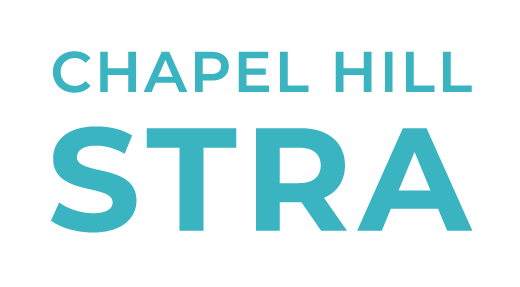Updated January 2023
Chapel Hill’s short-term rental ordinance was passed in June 2021 and went into effect (became enforceable) starting December 23, 2022.
Permits are now required to operate short-term rentals. Permit applications are now open here.
The following guide can help you implement best practices and get prepared to apply for and receive your STR permit.
Please note: Neither this guide nor the CHSTRA is the authority on local regulatory information. The purposes of this guide and other resources are informational only. STR operators should consult the Town of Chapel Hill for all regulatory and compliance information. Questions may be sent to Rae Buckley, rbuckley@townofchapelhill.org.
Chapel Hill STR Ordinance Summary
For any property used as a short-term rental (stays of 30 days or less) for more than 14 days/year must adhere to the following rules and requirements.
1. Allowed short-term rental zones by property type:
- Primary Residence STRs: The rental of a dwelling unit in whole or in part, or a dwelling unit with an accessory apartment, in which the primary resident lives at least 50% (183 days) of the year. These are allowed in all residential zoning districts.
- Dedicated STRs: The rental of a residential dwelling unit(s) on a property that is not used as a primary residence. These are allowed only in mixed-use and commercial zoning districts.
- Dedicated STRs are permitted in any multi-unit dwelling building limited to no more than two (2) units or three (3) percent of units, whichever is greater. Permits will be issued on a first-come, first-served basis.
Important: Check your HOA covenants to ensure your HOA allows STRs in your neighborhood. HOA rules may be more strict than the Town’s.
2. Zoning Compliance Permit (STR permit) required for all short-term rentals.
STR operators are required to obtain an STR permit annually ($150 fee). A permit number will be assigned to each residential unit and this permit number must be included in all online advertisements, including your Airbnb or Vrbo listing.
Upon application for an STR permit:
- STR operators will be reminded that homeowners insurance may not cover short-term rentals. (Read more about proper STR coverage here.)
- STR operators will be required to complete a health and safety checklist self-assessment. As soon as more details about this checklist are available we will add them to this guide.
- The Planning Department will notify neighbors within 100′ of the property line.
3. Operational requirements for all STRs
Summary:
- Simultaneous Rentals: The simultaneous renting of portions of a property by two or more unrelated groups. Example: One family stays in an ADU while a different family they do not know and are not traveling with stay in a guest suite.
- Simultaneous rentals only permitted when STR operator is on-site with guests in Primary Residence STRs
- Simultaneous rentals are prohibited in dedicated STRs
- Maximum Overnight Occupancy: 2 person(s)/bedroom + 2 people (Does not include children under 12 years of age)
- STR Designated Local Responsible Party
- Shall be available to respond within 2 hours to handle emergency situations
- Shall be available at all times that STR is rented
- Name, telephone number, and email address shall be posted in the STR
- May be the property owner
- Noise: Must comply with the Town Noise Ordinance.
- Parking: 1 space/bedroom + 1 parking space for each STR unit. View the Town Traffic Code here.
- Special Events: Permits may be required for special events impacting nearby residents or businesses. Learn more about special event permits here.
- Signs: Signs advertising STR use are prohibited
- Minimum Rental Age: Minimum of 18 years for the primary guest
- Minimum Rental Duration: Minimum of 18 hours, including overnight
View operational requirement details in Section 6.27 of the Land Use Management Ordinance.
An ounce of prevention is worth a pound of cure.
Our free guide and workbook will take you step-by-step through creating noise, parking and trash management plans that meet our local law requirements, as well as how to communicate them effectively to guests so they can have a five-star stay.
Know the warning signs for problematic guest stays.
Carefully vetting guests is one of the most important things a short-term rental host can do to protect your home, prevent nuisance issues, and be a great steward of our community. Here are some of the top red flags to watch out for.
4. Sales and Occupancy Taxes for Short-Term Rentals
All Chapel Hill short-term rentals are required to pay state sales tax, personal property taxes, transient occupancy tax (TOT), and any other applicable taxes and fees.
- 2023 Transient Occupancy Tax Rate:
- County: 3%
- Orange County occupancy Tax Return Instructions
- Orange County occupancy Tax Return Form – required by the 15th of each month even if no taxes are due
- Local:
- Hosts are required to register with the town for occupancy (TOT) taxes.
- County: 3%
- 2023 Sales Tax Rate:
- State: 4.75%
- County: 2.25%
- Local: 0%
In the state of NC, both Airbnb and Vrbo collect and remit sales tax and TOT on reservations booked through each platform. Hosts are still required to submit proper tax paperwork.
5. Enforcement of the short-term rental ordinance
The Town Manager will have the discretion to revoke an STR permit should he/she find that the STR operator is in violation of the zoning ordinance and provide a process for reinstating revoked permits. STR violations and penalties will follow the same complaint-based enforcement process as other zoning violations.

